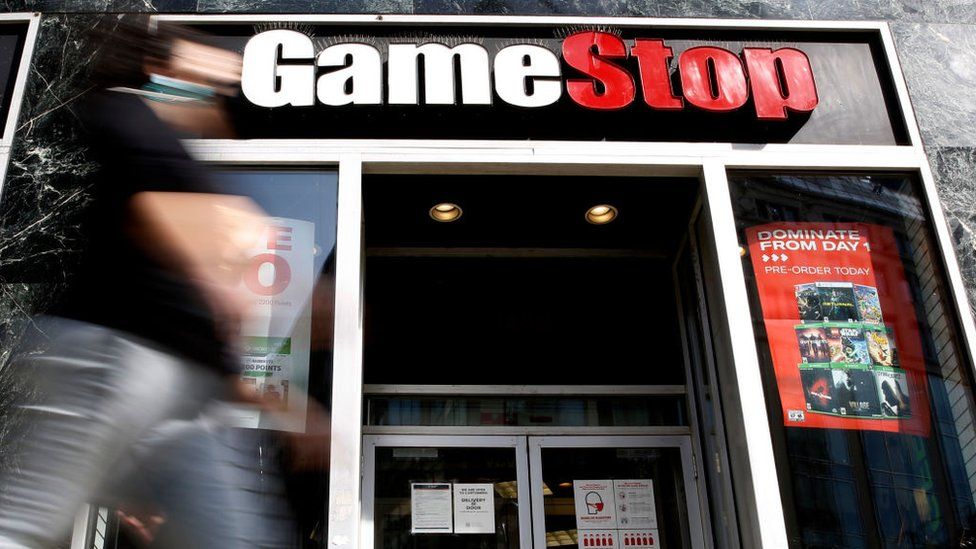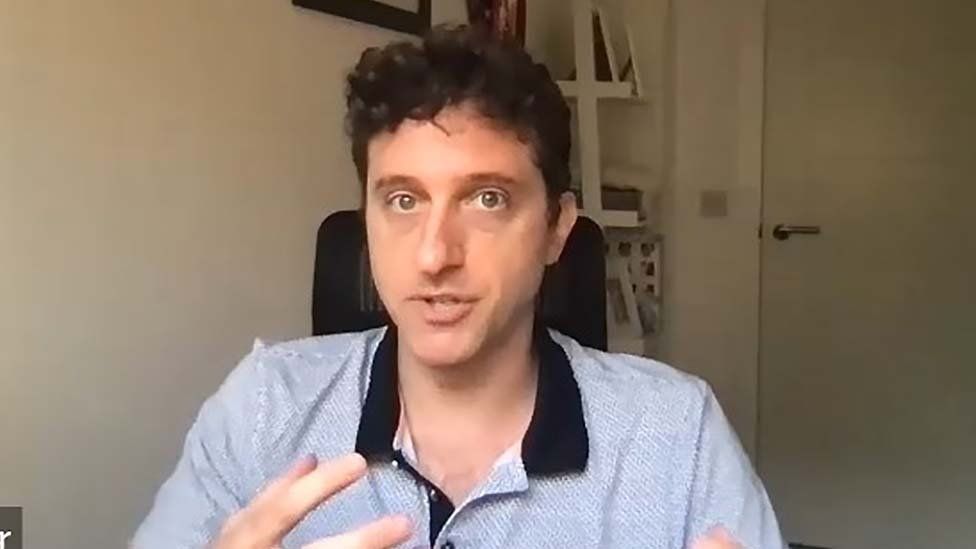Interest in investing and trading grew during the Covid pandemic, but experts warn of the risks.

image copyrightRichard Jones
Richard Jones, 18, has spent much of the past year working at Home Bargains. The rest of the time, he’s been investing in stocks.
The A-level student is among the thousands of people who’ve got involved via online share-trading platforms during the Covid pandemic.
But, while social media is awash with those flashing the trappings of trades and boasting of vast earnings, consumer groups and experts warn of the less “instagrammable” risks.
Richard, from Penrhyn Bay, Conwy county, said it had certainly been a “rollercoaster”.
“In January, I was getting quite bored during lockdown and I needed something new to get into, and I wanted to find a way of making my money work for me,” said Richard.
“I was up quite a bit at one point, then down quite a lot. Now I suppose I’m up £400,” he said.
Online brokers such as Charles Schwab, TD Ameritrade, Etrade and Robinhood have seen millions of new accounts opened during the pandemic, particularly when fear stalked the markets and prices dropped in March 2020.
The emergence of online share-trading apps, where users can buy shares or fractions of shares on their mobile phones for low fees, has driven this new wave of interest.

image copyrightVIEW press/Getty Images
“I saw quite a lot of videos on investing on TikTok and YouTube and it sort of got me into it,” said Richard. “I decided to just watch more and more videos and teach myself about it to see what to put my money into.”
He has put in £3,000 from a trust fund, previous savings and cash he has put by while working part-time at Home Bargains before he heads off to study politics at the University of York.
The influx of amateur investors hit the headlines earlier this year, during high-profile clashes over several so-called “meme” stocks.
These involved major hedge funds battling with retail investors swapping tips on social media sites such as Reddit or Twitter and driving up prices on stocks for companies including GameStop and AMC.
Gary Power, of investment company Charles Stanley, said the Cardiff office where he worked had seen roughly double the usual number of young students getting in touch in connection with work experience since March 2020.
“It’s increased because of what we’ve seen – the fact that it is now front-page news,” he said, adding that client enquiries about investing had also risen.
However, he urged anyone thinking about investing their own money not to be seduced by the image of massive rewards with low risks.
“You could argue that some smaller retail investors might have shot the lights out [in the last year] but many others would have found themselves in very difficult situations.
“And generally, people will not own up to their mistakes – that is not instagrammable.”
Others have warned that online discussion forums and social media can put pressure on inexperienced investors and, for some, trading can become addictive.

image copyrightNicola Knight
Nicola Knight, 41, a marketing manager and mother-of-three from Llantwit Fardre, Pontypridd, started investing in June 2020 and now counts herself among the thousands of UK day and swing traders – those carrying out several trades within one or a few days to take advantage of market movement.
“I would never have known about any of this if it wasn’t for Covid, because of the impact it had on pension funds in the stock market,” she said.
She started with an investment of £2,000 and is currently about 1,500% up – although she said she had spent the first six months losing as much as she made while learning about the market.
“For me, trading is a purpose to get a cash flow that is coming in as supplemental income. So, we live our normal lifestyle from our normal income and then any money we get from trading goes into a separate pot.
“Ideally, I want to buy properties at auction or in cash so that there’s no mortgage on them, which will be for our retirement.”
Nicola said interest in investing had grown massively in the last 16 months, with a Facebook group she helped to run for investors in penny stocks – those worth less than $5 (about £3.60) a share – now having more than 7,500 members.
However, she said due diligence and strategy were key.
“I try to tell everyone in my network, ‘please, please don’t buy stock if you know nothing about it. Just because somebody has mentioned something, don’t buy it’.”


Guy Anker, deputy editor of the Money Saving Expert website, said it had seen more inquiries from people about different kinds of investing as rates for traditional savings accounts had dropped even lower from a low base during the pandemic.
“If there’s one thing for you to consider when it comes to investing, it’s risk,” he said.
“Sometimes there’s potential to make lots of money, but you can lose some or all of your money, never lose sight of that. Make sure you only invest money you can afford to lose and do your research before going ahead with it.“
He said it was important people considered what kind of investment, if any, might be right for them, as there were numerous options.
“A lot of people start out with funds. This is typically where a fund manager will run a fund of money for lots of people. They are going to spread that risk among lots of types of shares – maybe different commodities, maybe corporate bonds, gilts, shares, they could go into art – who knows?
“But funds are a good way to start because somebody else is doing a lot of the leg work for you.”
He said it was also important not to put all your eggs in one basket and to be aware that you cannot necessarily access your money as quickly and easily as with a savings account if it’s invested.
“Linked to that, it’s normally best to save for the long-term. Investing shouldn’t be seen as a way to make quick cash.”


image copyrightJames Howells
In 2013, James Howells had 7,500 Bitcoin on a hard drive – today they’re worth about £180m. The only problem is he mistakenly threw away the hard drive and has since been asking his local council for permission to search landfill. Earlier this year, he promised to donate 25% of the value of the digital currency to his home city of Newport in south Wales if he found the hard drive.